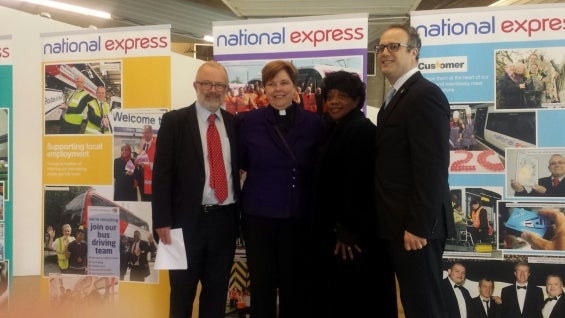Press Releases
Teamsters Join Community Leaders, Shareholders in Calling for Independent Monitoring Program at National Express AGM

(LONDON) – Today, the Teamsters Union and other institutional shareholders, along with community, faith and global labor representatives spoke at the National Express Group (NEX: LON) Annual General Meeting (AGM) in London. They spoke in support of an independent monitoring program at the company’s U.S. school bus subsidiary, Durham School Services.
At the AGM, shareholders voted on Resolution 22, which called for an independent monitoring process at Durham School Services, the second-largest student transportation provider in the United States.
Nearly a quarter of independent shareholders did not back the National Express Board of Directors’ recommendations on Resolution 22. Resolution 22 received the largest vote in favor of a shareholder resolution on labor rights at a United Kingdom-based company in the past decade.
At the AGM, concerned shareholders and proxies argued the need for the implementation of an independent monitoring program at National Express.
“This is about children on buses. I have met with workers at Durham and their concerns are widespread. I implore you to close the gap between how workers are treated in the U.S. and the U.K. by passing Resolution 22,” said Rev. C.J. Hawkings, a United Methodist minister and Executive Director of Arise Chicago, a membership-based community group that advocates for workers’ rights.
Professor William Gould, former chairman of the National Labor Relations Board and independent monitor of United Kingdom-based transportation company FirstGroup from 2008 to 2011, spoke at the meeting. He discussed his former role as independent monitor at National Express’s chief competitor in the United States student transport market.
“A delay in justice is equivalent to its denial, and a delay in justice serves neither the employer nor the employee,” Gould said. “I came here today because I felt it my obligation to let shareholders know the facts about this program. It worked well at FirstGroup and I’m proud of its accomplishments.”
“What I’d like to see is the company value and respect its employees. We need to see some walking the talk and an independent party. This company needs to instill goodwill in Charleston and the other communities it serves,” said Dot Scott, president of the Charleston, S.C. branch of the NAACP.
One shareholder in the audience compared Scott’s account of working conditions at Durham in Charleston, S.C., to “a story from a third world country.”
Richard Greening from the Islington Council Pension Fund, with 95,000 shares in National Express, spoke up in favor of Resolution 22.
“Independent review carried out by someone the Board and trade union have confidence in would be a good way to focus back on the prosperity of the company, health and safety of the workplace and excellent customer service—it’s what we all want to see,” Greening said.
The resolution was submitted by the Teamsters General Fund, members of the Local Authorities Pension Fund Forum (LAPFF) and 100 individual National Express shareholders—owners of approximately two percent of the company’s stock. It was the first resolution to be recommended by ISS, the top proxy voting advisor, in at least 10 years that specifically addresses labor issues at a publicly-traded company in the United Kingdom.
On May 1, 32 members of the U.S. Congress sent a letter urging the National Express Board of Directors to institute an independent review of Durham.
More than 30 Members of Parliament recently put forth an Early Day Motion, condemning the anti-trade union activities of National Express.
Two Parliamentarians, Ian Lavery and Jim Sheridan, recently issued a report revealing serious concerns at National Express’s U.S. subsidiary, calling for intervention by the company’s Board of Directors to resolve these issues. Lavery and Sheridan traveled to the United States in February after hearing reports from Durham school bus workers, parents and community leaders about poor working conditions and anti-union bias at Durham operations in the U.S. The report details poor worker treatment and working conditions, including unpaid wages for time on the job, at the company’s U.S. school bus yards.
For more information on the resolution and National Express’s record in the U.S., go to www.busfair.org.
The Teamsters’ Drive Up Standards campaign is a global campaign to improve safety, service and work standards in the private school bus and transit industry. Since the campaign began in 2006, more than 38,600 North American school bus and transit workers have become Teamsters.
Founded in 1903, the Teamsters Union represents 1.4 million hardworking men and women throughout the United States, Canada and Puerto Rico. Visit www.teamster.org for more information. Follow us on Twitter @Teamsters and “like” us on Facebook at www.facebook.com/teamsters.
-30-